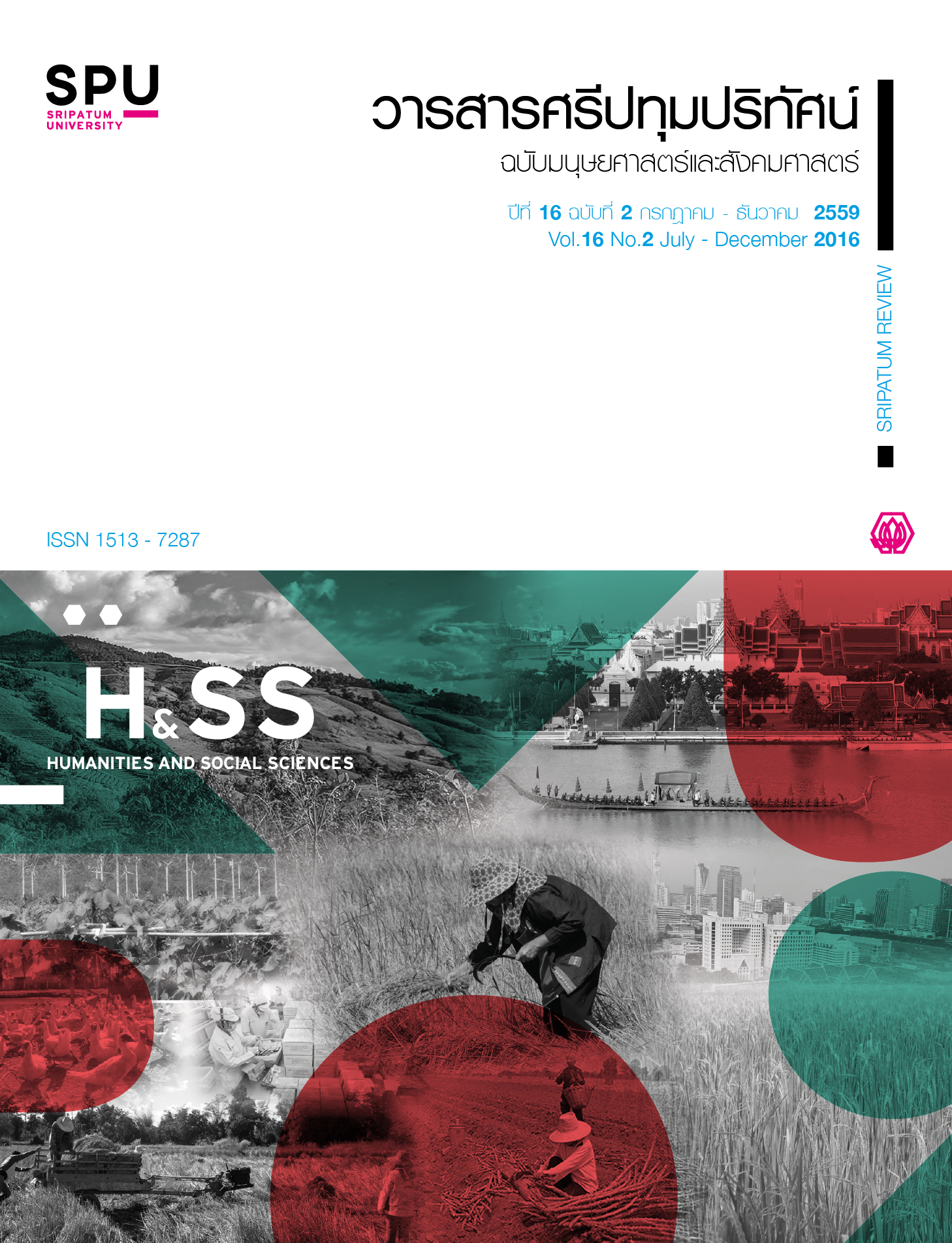THE INFLUENCE OF ENGLISH LANGUAGE ON BILINGUALS’ COGNITION: A TEST OF THE LINGUISTIC RELATIVITY HYPOTHESIS IN THAI SPEAKERS
Main Article Content
Abstract
The linguistic relativity hypothesis mainly focuses on the relationship between language and cognition. Its main idea is that speakers of different languages tend to think differently. In contrast, speakers of languages with grammatical similarities tend to apply identical worldview. The present study aimed at investigating the linguistic relativity hypothesis by analyzing the relationship between tense in English and time concept of Thai-English bilinguals. A memory task was used to study the effect of language on cognition. The results showed that the bilinguals with high English proficiency tended to perform better in time memorizing task than those with basic and intermediate proficiencies. The results of this study indicate that language influences thought.
Article Details
1. กองบรรณาธิการสงวนสิทธิ์ในการพิจารณาและตัดสินการตีพิมพ์บทความในวารสาร
2. บทความทุกเรื่องจะได้รับการตรวจสอบทางวิชาการโดยผู้ทรงคุณวุฒิ แต่ข้อความและเนื้อหาในบทความที่ตีพิมพ์เป็นความรับผิดชอบของผู้เขียนแต่เพียงผู้เดียว มิใช่ความคิดเห็นและความรับผิดชอบของมหาวิทยาลัยศรีปทุม
3. การคัดลอกอ้างอิงต้องดำเนินการตามการปฏิบัติในหมู่นักวิชาการโดยทั่วไป และสอดคล้องกับกฎหมายที่เกี่ยวข้อง
References
ราชบัณฑิตยสถาน. 2553. พจนานุกรมศัพท์ภาษาศาสตร์ (ภาษาศาสตร์ประยุกต์). กรุงเทพฯ: รุ่งศิลป์การพิมพ์.
Archila – Suerte, P., Zevin, J., Bunta, F., Hernandez, A. E. 2012. “Age of acquisition and proficiency in a second language independently influence the perception of non – native speech.” Bilingualism : Language and Cognition 15; 190 - 201.
Athanasopoulos, P. 2009. “Cognitive representation of colour in bilinguals : The case of Greek blues.” Bilingualism : Language and Cognition 12; 83-95.
Athanasopoulos, P. 2011. “Color and bilingual cognition.” Language and bilingual cognition. Edited by Vivian Cook and Benedetta Basstti. New York: Psychology Press.
Barner, D., Inagaki S., and Li, P. 2009. “Language, thought, and real nouns.” Cognition 111; 329 – 344.
Boroditsky, L. 2001. “Does language shape thought? Mandarin and English speakers’ conceptions of time.” Cognitive Psychology 43; 1 – 22.
Boroditsky, L., Fuhrman, O., McCormick, K. 2010. “Do English and Mandarin speakers think about time differently?.” Cognition 118; 123 – 129.
Chen, J. Y. 2007. “Do Chinese and English speakers think about time differently? Failure of replicating Boroditsky (2001).” Cognition 104, 2; 427 – 436.
Diaz, R. M., and Lingler, C. K. 2000. Language processing in bilingual children, Ellen Bialystok(eds.). Cambridge: Cambridge University Press.
Frank et al. 2008. “Number as a cognitive technology: Evidence from Piraha language and cognition.” Cognition 108; 819 – 824.
Fuhrman, O., and Boroditsky, L. 2010. “Cross-Cultural Differences in Mental Representations of Time: Evidence From an Implicit Nonlinguistic Task.” Cognitive Science 34; 1430–1451.
Fuhrman, O., McCormick, K., Chen, E., Jiang, H., Shu, D., Mao, S., Boroditsky, L. 2011. “How linguistic and cultural forces shape conceptions of Time: English and Mandarin Time in 3D.” Cognitive Science 35; 1305 – 1328.
Gordon, P. 2004. “Numerical cognition without words: Evidence from Amazonia.” Science 306; 496–499.
January, D., Kako, E. 2007. “Re – evaluating evidence for the linguistic relativity hypothesis: Response to Boroditsky (2001).” Cognition 104, 2; 417 – 426.
Li, P., Dunham, Y., and Carey, S. 2009. “Of substance: The nature of language effects on entity construal.” Cognitive Psychology 58; 487 – 524.
Lucy, J. 1992. Grammatical categories and cognition: A case study of the linguistic relativity hypothesis. Glasgow: Cambridge University Press.
Whorf, Benjamin Lee. 1956. Language, Thought, and Reality: Selected Writing of Benjamin Lee Whorf. Edited by John B. Carroll. Cambridge: the M.I.T. Press.


